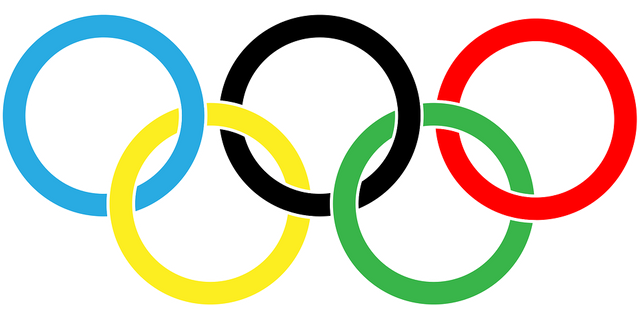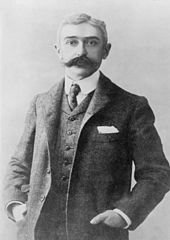Olympic sports competitions
Olympic sports competitions or Olympic Games (French: Jeux olympiques Zooslopic) is an international sports competition where participants from different countries participate in different types of events in the summer and winter events. The Olympic Games, which are played in more than two hundred countries, are considered as the world's largest and most respected competition. [2] Olympic Games are held every four years. Two types of summer and winter competitions occur every two years, which means that almost every two years after the Olympic Games were held. From the ancient Olympic Games that began in Olympia in ancient Greece in the eighth century BC, the idea of the modern Olympic Games originally came from. In 1894 Baron Pierre the Kuberty formed the first International Olympic Committee (IOC). This IOC controls all activities related to the Olympic Games.
There have been many changes in Olympic Games since the Olympics in the 20th and 20th centuries. One of these changes is the introduction of the Winter Olympics, the Paralympics for the disabled and the Youth Olympic Games for teenage athletes. To make these changes successful, the IOC has to achieve many economic, political and technical skills. As a result, the opportunity to take part in the competition by professional athletes, after moving away from Pierre the Kuberty's non-fiction. This competition was discontinued during World War I and World War II and during the Cold War this contest was held in a limited range.
The Olympic Games are held in conjunction with the International Sports Federation, the National Olympic Committee and the Committee for Each Year. The IOC reserves the right to select the host country for every event. According to the Olympic Charter, the host country will bear the cost of organizing these games and collect funds. But all the decisions related to sports events of the Olympic Games are accepted by the IOC. In addition to sports competition, there are more other rituals and ceremonies in Olympic Games such as Olympic torch, flag, opening and closing ceremonies etc. About 13,000 athletes participate in 400 divisions of 33 sports at the Summer and Winter Olympics. Gold, silver and bronze medals are given for the first, second and third place holders of each division respectively.
The Olympic Games in the cycle of rotation has reached a position that almost every country participates in this competition. As a result, many years of debate has arisen like boycotts, drugs, bribery and terrorist activities. Every two years, the Olympic and Sporting Promotions give an obscure sportsman an overnight chance of national and even international fame. Organizing the Olympic Games also organizes such programs and offers a chance to express themselves around the world.
Ancient Olympic Games
In ancient Greece, the Olympic Games were held alongside religious customs at Zeiss's residence Olympia. Originally representatives from ancient Greek city states participated in this sports competition. In addition to the usual sports competition, wrestling, races and rath competition were held in this event. Ancient ancient texts show that there were rivalry or warfare between different city states, but it was postponed during this competition. This war and the suspension of Danny was called "the policy of the ceasefire of the Olympics". Although this ancient idea may be a storytelling because the Greeks did not cease any of the tragedies. However, this style helped pilgrims move freely through various fighting cities of the Olympiad. Because they thought that Zeus would protect all the pilgrims. The birth of the Olympics is still a mystery and legend to the people. But according to a popular tale, the god Jude and his son Heraklis or Hercules were the father of this Olympic Games. According to this story, Heraclies named the event the Olympics, and after every four years, the Games started the show.
According to this legend, Heraclis made an Olympic stadium in honor of his father Zeus after his twelve epic expedition. After completing this work, Heraclis walked straight 200 steps and declared it as a stadium. Later it is known as the unit of distance measurement. The information received from an ancient Olympics article suggests that the Olympics started in the year 776 BC. In this script, the winners were recorded in the race competition held after four years. In this ancient sports competition, race competition, wrestling, boxing and races competition are held. According to the people's knowledge, Corrives became the first champion of a Chess Olympics in the city of Elis.
Originally, the Olympics was a traditional sporting event to honor Zeus and the king of Olympia and mythological hero Pilopus according to religious rituals and customs. King Pillops was famous for his chariot competition with Vineous. The winners were honored at the Olympics. Songs and poems were written for them. This event was held every four years, and this four-year period was called an Olympiad, which was a unit of time for the Greeks.
The Olympic Games were at the top of popularity in the sixth and fifth centuries BC. However, with its influence on the rise of Rome and its influence on Greece, its effectiveness began to decline. Although no reliable source is found in the Olympic Games, it is generally believed that this game was finished in 393 AD when Emperor Theodosius banned all pagan activities. However, there was no direct reference to the Olympics by Theodosius's order. Also, many believe that when the second Theodosius ordered the destruction of all the Greek temples in 426 AD, the game would end.
Modern Olympics
Founders
In modern times, the Olympic Games meant the modern sports competition started in the 17th century. The first such event was the Cotswald Games or the Cotswoud Olympic Games, which started in England. Between 1612 and 1642, this was the chief organizer of the Cotswald game, Robert Dover, who was a British lawyer. In London, the 2012 Olympic Games' outreach program announced the event of the 17th century as the introduction of Britain's Olympic Games.
The El Olympiad de la Republican Games, held in France from 1796 to 1798, also holds the tradition of the ancient Olympic Games. Some of the sports competitions held at the ancient Greek Olympic Games were held at the Olympics. Behil was the first to follow the measurement of the matriculation system in this El Olympiad de la Republique game held in 1796.
In the 1850s, Michael Weinle, the laborer of England, started the Olympic Games in the modern era by Dr. William Penny Brooks. Dr. Brooks named the game Wenlock Olympian Games. This playlist has consistently continued till today. Dr. Brooks established the Wenlock Olympian Society on November 15, 1860 for this game.
From 1862 to 1867, the annual Olympic Festival was held in Liverpool, England under John Holly and Charles Mills. The sporting event was international, but the quality of the profession was very low. Only elite and amateur players of decent societies could participate in this event. However, the Olympics held in Greece in 1896 were almost identical to the Olympics held in Liverpool. In 1665 John Holly and Dr. Brooks formed the National Olympic Association, which later became the guiding role for the formation of the British Olympic Association. Not only this, the Olympic Charter is written based on the scope of this organization's constitution. A national Olympic Games were organized in 1866 in Crystal Palace, London, Great Britain.
Renaissance
The Liberation War in 1821 was liberated from the Ottoman Empire. Since the victory of the Liberation War, the Greeks were thinking of reviving the Olympic Games. Panagiotis Sutsas, the poet and newspaper editor at one time, was the dreamer of this reincarnation of the Olympics. In 1833, he presented this thought in a poem called Dialogue of the Dead. Later, Evangelos Jappus, a wealthy and philanthropist, expressed his intention to help build a fund to resume the Olympic Games by writing a letter to King Otto of Greece. In 1859, the sponsorship of Evangelos Jappas took place in the city of Athens in the Olympic Games where the Ottoman Empire and Greece's athletes participated. He also renovated a stadium with his money so that the future events could be held smoothly.
The Olympic Games in 1870 and 1875 were held at the revamped stadium of Evangelos Jopps. Approximately thirty thousand viewers were present at the 1870 Olympics, but there was no general information of how many visitors were seen in 1875. Seeing the Olympian Games of the Wenlock Olympic Society in 1890, Baron Pierre de Kuberty received the inspiration to establish the International Olympic Association. He planned to form an Olympic Committee with Brooks, which will host the Olympic Games in every country after four years.
The year 1896
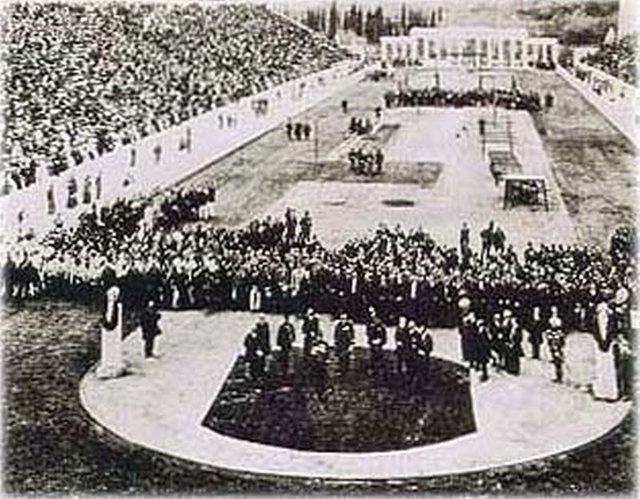
source
The opening ceremony of the Olympics at the Panathianico Stadium.
The first Olympic Games were held under the supervision of the International Olympic Committee in 1896 at the Panathenike Stadium in Athens. In this sporting event, about 241 athletes from 14 countries were gathered in 43 competitions. [25] Evangelos Jappas and his cousin Constantinos Jappas left a fund for the Olympic Games held in the future by the Greek government, the Olympic Games in 1896, from the trust's fund. [26] [27] [28] George Everf, a Greek businessman, in the lead of the Olympic Games
The Greek government and the people were very proud and excited by organizing this Olympic Games. While some athletes preferred to organize these games forever in Athens, the International Olympic Committee was favorable in spreading the Games in many countries. The next summer of Greece Olympics was held in Paris in France.
Changes and corrections
After the success of the year 1896, the Olympic Games went through a stagnant period when its existence became compromised. Both the Olympic Games in 1900 and 1904 were celebrated as a follow-up to France's famous Paris Exhibition and the World Miles in St. Louis City of America respectively. There was no separate stadium to start the Olympic Games in Paris. But for the first time women participate in this event is a memorable one. On the other hand, only 650 athletes from across the world participated in St. Louis's games, of whom 550 were the hosts of the United States. However, the game started to revive again from the 1906 under-Olympic Games. The name of this game was superseded or intercalated because the Olympics was held in Athens in the third Olympiad after the first Olympic Games were held. Initially, the International Olympic Committee honored the game, but later accepted that recognition. On the other hand, the superstition games have never been held once again.
Winter Olympics
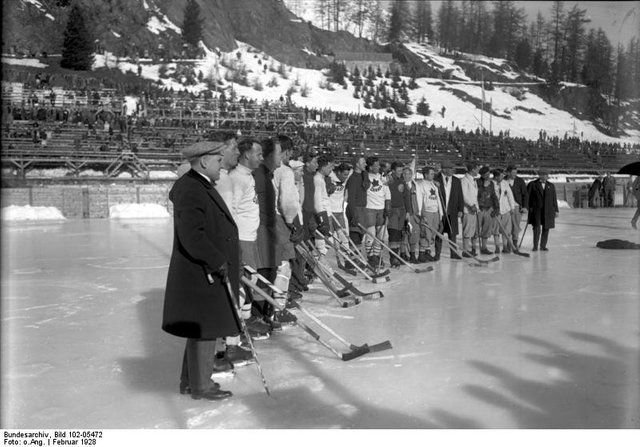
source
The Winter Olympics were initially originally intended to encourage snow and ice sports, which is almost impossible to host during the summer. Figure skating (1908 and 1920) and Ice hockey (1920) were held in the summer Olympics. IOC has included more such sports for ice-cream sports to make this sport more widespread. The Olympic congress in Lusan, in 1921, decided to include a Winter Olympics event in the Olympics. Three weeks before the Paris Games were held in Paris, in 1924 a winter sports week was held in Chamonix of France (actually held for 11 days). This sport week is the world's first winter Olympic sports competition. [33] Although the winter and summer events of the service were held in the same country, the IOC skipped this plan later and announced that since then the Winter and Summer Olympics held every four years in the same year . [34] This decision of the IOC was in force till 1992. Since the Olympic Games in 1992, the Winter Olympics are held every four years, but after two years of the Summer Olympics.
Para Olympics
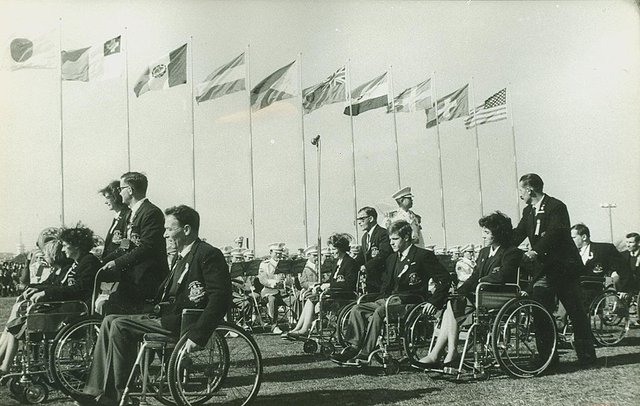
source
The 1964 Summer Paralympics held in Tokyo
In 1948, Sir Ludwig Guttman started the multi-event competition in 1948 London Olympics, among some hospitals for the rehabilitation of the injured soldiers in World War II. Gatman's event is known as the Stoke Mendieval Games, an annual sports event. From then until the next year, Gatman and his associates used this game as a means of rehabilitation and cure of the disabled people. At the 1960 Olympics in Rome, Guttman and his supporters brought about 400 athletes to participate in a "Parallel Olympics". This was the first paralympic in the history of the Olympics. Since then, this paralympic game has been held every year in every Olympic ceremony. In the South Korean city of Seoul in 1988, both the Summer Olympics and Paralympic Games were held in the same city for the first time. [35] In 2001, the International Olympic Committee and the International Paralympic Committee signed an agreement to decide whether the country will be hosting the Olympic Games, as well as the Paralympic Games It has to be arranged. [36] [37] This agreement was signed in 2008 in Beijing and V. Its implementation began at the Winter Olympics in Vancouver. About the paralympics held in London in 2012, Lord Co London, president of the London Olympic Games, said:
We want to change the attitude of people with disabilities and people with disabilities and celebrate the Paralympic Games, and want to tell them that these two games are actually interwoven with each other.
Youth Olympics
Youth Olympic Games were added to the original Olympic Games in 2010 to give opportunity for athletes from 14 to 18 years old. Its chief architect was IOC president Jacques Rogge. He proposed this Youth Olympics in 2001, which was approved in the 119th Congress of IOC. The first summer Olympic Games were held in Singapore on August 14-26, while the winter season was held two years later in Istanbul, Austria. This youth Olympic Games was held in less than the main event of the Olympics. The winter season is held for nine days, where 970 athletes and 580 representatives can participate, while the summer event is for 12 days where 3500 athletes and 875 representatives can participate. Like the original Olympics, there are several types of sports competitions, but some events are omitted to reduce its stability, mixed groups of women and men are formed in some games, and even the National Olympic Committee's mixed team is formed.
The Olympics in the 21st Century
In 1896, the Olympics started with only 241 athletes from 14 countries; At the 2012 Summer Olympics, those games have become a great sport for 10500 athletes in 204 countries. From the Summer Games to the Winter Games, the size of the game is far too small, for example, in the 2010 Winter Olympics held in Vancouver, 2566 athletes from 82 countries participated. The place where the athletes and officials are allowed to live during the gym is called Olympic Village. This Olympic Village offers cafeteria, health center and other facilities for religious rituals.
The International Olympic Committee does not consider sovereignty as a preliminary condition for the membership of different countries like other international organizations. As a result, different colonies and sovereign nations also have the opportunity to participate in the Olympics and send the athletes. For example, - Puerto Rico, Bermuda and Hong Kong are participating in the Olympics as a separate country even after being in another country. According to the current charter of the International Olympic Committee, "an independent country recognized by the international community" has the right to participate in the Olympics by forming the National Olympic Committee. For which IOC did not allow St. Martin and Curacao to form the National Olympic Committee; Where the same constitutional status allowed Aruba to form the Aruban Olympic Committee in 1986.
Economic and social impact on the host city and state
Many economists are skeptical about the benefits of organizing the Olympics because it costs a lot to organize "big events" like the Olympics, and most of them go abroad by import, so that there is a possibility of the opposite effect of the economy. In the opposite logic, the organizers show their open commercial entrance and social responsibility to the whole world by organizing (or just claiming) the Olympic; As a result, the organizers indicate the growth of the country's exports. It has been proved that the headquarters of the business company in the city organizes substantial investments in the local sports organizations and local infrastructure, and facilitates the local non-profit organizations as well as the local people. This facility has been seen in the host city even after a few years of the end of the Games since the beginning of the Games. Apart from visiting the country during the Olympics, local tourism businesses also get the opportunity to promote themselves.
It may not always be a pleasure for the cityman to bring some benefits to the city hosted by the Olympic Games. In their study of Center for Housing Rights and Evictions, nearly two million people had to leave their homes in the two decades. Most of them are the so-called low caste people of the society.
International Olympic Committee
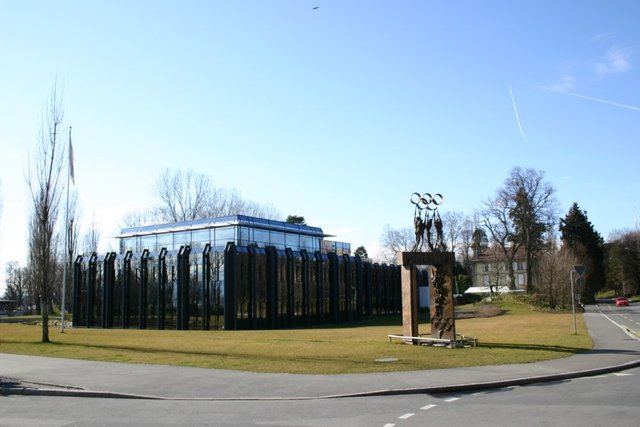
source
Headquarters of the International Olympic Committee in Lausanne, Switzerland.
The International Olympic Committee was formed in coordination with each of the various international sports organizations and federations, accredited media, popular athletes, international judges, state representatives and organizations that observe the rules of the Olympics. [53] Although there are many organizations associated with the Olympics, the host country Selection, sports development plan, surface Osaka and pracarasatbera kept to yourself all the power to decide the International Olympic Committee. [54] The International Olympic Committee is working through some of the bodies. Organizations are:
International federation
National Olympic Committee and
Organizing Committee
The official language of the IOC is French and English. If the language of the host country is not French or English then that language is also used in the Olympics. That is, each announcement is given in English, French and local languages.
Commercialization
Initially, IOC opposed the collection of money from the corporate sponsors for the Olympic Games, but since 1972, the IOC gave a favor to the business partners' favorable and lucrative propositions, and since the time of the Joao Antonio Samaranch, the Olympic Games has given the corporate sponsors a chance to market their products. Getting the amount of funds is coming.
Budget
In the first half of the twentieth century, the Olympics were held in the low budget. From 1952 to 1972, the IOC President rejected the All-Party All Offer for Commercial Interest in the Olympic Games. He believed that if the Olympic Committee had a business relationship with commercial companies, they would try to influence the IOC. During the bandage, the organizers of the Olympics used money from their own sponsors and used their own symbols. Until the retirement of the brand, only two million US dollars were deposited in the Olympic Committee fund. But eight years after his retirement, there were about 450 million US dollars in the IOC fund.
Television effects

source
The Berlin Olympics was first publicly broadcast on television in 1936. This broadcast could only be enjoyed by local viewers. The first international broadcast of the 1956 Winter Olympics was made. The next winter Olympics TVSTV was commercially sold. A Chevlevion Broadcasting Company, CBS, provided $ 3,94,000 in the United States for its TV rights. Besides, the European Broadcasting Union gave approximately six and a half million US dollars for TV rights in Europe. The Cold War took place in the sixties, focusing on political influence between the world's various superpowers; And the IOC was increasing the price of TV rights by utilizing this opportunity. From this huge amount of TV rights, the Olympic Committee attempted to make the Olympic Games more popular in general, and as a result, its television audience grew more and advertisements made on TV became more popular with commercial companies. In this process, the price of television in the Olympics from the next decade continues to skyrocket. For example, for the 1998 Nagano Olympics, CBS gave $ 350 million US dollars, while from 2000 to 2012, NBC spent approximately US $ 350 million for the rights of broadcasting.
From the late 1960s to the late 20th century, the Olympic television audience continued to grow. For the benefit of satellites and live broadcasts, the 1964 Mexico Olympics enjoyed nearly 60 million viewers. The number of visitors to the Los Angeles Olympics in 1984 was approximately 90 million and at the 1992 Summer Olympics held in Barcelona in 1992, the number of visitors was approximately 350 million! But since 1992, since the growth of the Internet and the increase in competition among television, the audience gradually started to fall. Especially since the introduction of Olympic event events and direct video access to the Internet, the number of visitors began to appear in deficit. When the number of visitors decreases, IOC's TV rights can reduce the revenue from the IOC, and take some measures to keep the audience. Among them, the grand opening ceremony and closing ceremonies, innovation in promoting the duration of various games and promotions. After all, there were significantly less than the number of visitors to the 2002 Winter Games in 2006. However, the 2012 Summer Olympics have been able to attract the most distant viewers in the history of the United States.
Debate
The ownership of the Olympic brand is being criticized for commercial companies. The main allegation was that there was no difference from the other economically profitable sports competition. One of the evidence is the 1996 Atlanta and the 2000 Sydney Olympic Games. These organizing cities covered many commercial companies with their Olympic brand's many products, with intense marketing competition. Which was against the original principle of the Olympics. Later, the Olympic Committee announced that steps will be taken to stop such excessive business promotion in the future. On the other hand, the organizers of the Olympic Games carry all the costs related to the country, games and infrastructure; However, from the decision of the IOC Olympic Games, all of the income received from the Olympic symbol is taken. It also takes some parts of the money received from TV rights and other commercial sponsors. After all, different countries participated in the competition for the right to organize the Olympics, knowing very well that they might not return anything to their investment. However, the study found that organizing the Olympics increased business volume of the country by about 30%.
Symbol
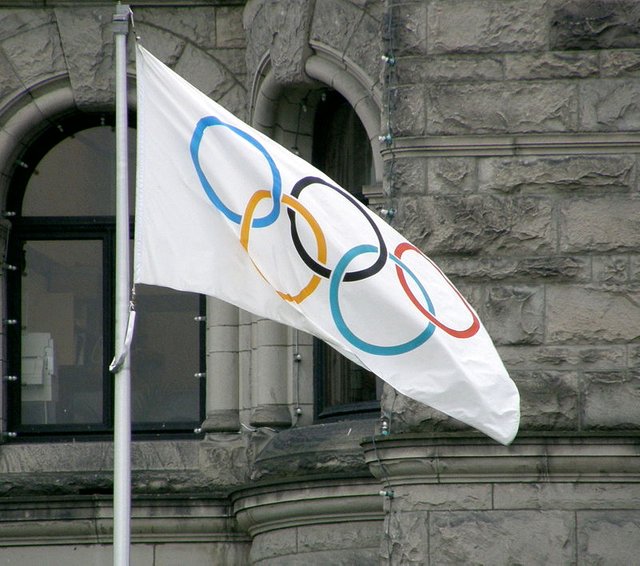
source
Olympic flag
According to the Olympic Charter, all the Olympic games are used to reflect the principles of the Olympics. The Olympic symbol, which is known as the Olympic ball or the Olympic symbol in Bengal, consists mainly of five balls connected to each other. These five letters of the flag indicate the continent of Africa, America, Asia, Oceania, and Europe. The five colors of the five colors of blue, yellow, black, green and red are the main reason for choosing any one or more of these five colors is used in every country's flag. This Olympic flag was first received in 1914, but it was first officially billed at the 1920 Summer Olympics in Belgium's Antwerp.
The motto of the Olympics is Latin, Citius, Altitude, Fortyas or faster, higher, and more. This motto is the first proposal of Baron Pire's The Kubertan friend, Dominican priest Henry Dedon OP, in 1891 at a youth conference in Paris.
The concept of Olympics related to Kuvaratta is seen in the description of Olympic religion:
The most important thing about the Olympic Games is not victory, but rather the participants, just as the most important thing in life is to struggle, not to win. The important thing is good fight; Not to be defeated by others.
Several months before the start of each Olympics, Olympic flame lit up in Olympia, in a ceremony as per ancient Greek rituals. A female carpenter, in a puccini, coordinated the sunlight with the help of a superb mirror and lit the Olympic torch for the first relay carrier. This is how Olympic torch racing begins. The race ended in the Olympic Stadium of the City, where the torch played an important role in the inauguration ceremony. Although Olympic flicks since 1928 are one of the symbols of the Olympics; The torch racing was added to the 1936 Berlin Olympics.
Olympic mascot was used for the first time in the 1968 Mexico Olympics. This mascot is basically the statue of the cultural or heritage of the country's cultural heritage. In the day-to-day, it played a major role in the propaganda of the Olympic Games. Especially in the 1980 Moscow Olympics, Massachuset Velukchhana Misa has gained tremendous popularity across the world. Wenlock is the name of the Olympus games; Because, this game is held by UK vendor Michael Weinle, which is still regularly held. This game inspired Kublin's idea of organizing the Olympics.
Events
Opening ceremony
.jpg)
source
A view of the inauguration of the 2012 London Olympics.
An Olympic ceremony was organized before the start of the Games in accordance with the rules given in the Olympic Charter. Generally, the rules of this ceremony were correct during the 1920 Summer Olympics. The program usually starts with hoisting the flag of the host country and singing national anthem. After this, the host country offers the joy of the audience through various aesthetic exhibitions. In addition to this, the host country gets the opportunity to showcase its own creations, art, heritage and history. On this occasion, the host country has spent a lot of money and tried to showcase its pride and capability to the world. For example, at the opening ceremony of the Beijing Olympics, approximately US $ 100 million is spent.
After the spectacular exhibition, athletes from various countries round the Olympic Stadium in front of the audience. Greece's athletes first came in this round and the last time the athletes of the host country came in. Grease was first honored for Greece's role in the history of the Olympics. After Greece, according to the country's favorite barnamala, the sportsmen of all countries round the stadium, and the host country comes to the end of the whole. During the 2004 Summer Olympics in Athens, Greece, the Greek flag first circulated and according to the rules, Greece's athletes and officials rounded off this episode. After the parade of different countries, the Olympic torch reached the stadium and after reaching the hands reached the final torch vendor. Generally, a former Olympic champion of the host country, the Olympic torch flick as the ultimate torch bearer of the Olympics.
Closing ceremony
After the completion of all the sports competitions of the Olympic Games, closing ceremonies were organized to finish the formal finale of the sporting event. In the beginning of the ceremony, flutist athletes came to the ground with their flag of their respective countries. All the players from all the participating countries came together on the stadium together behind them. Flags of three countries were hoisted and their national anthem was played at the closing ceremony. These three countries are the host country of the outgoing Olympics, Greece (in honor of the birthplace of the Olympics.) And the organizers of the subsequent events. After the withdrawal of the lease, the President of the Olympic Organizing Committee and the IOC President gave a closing speech and the Olympic Olympics were announced with the completion of the Olympics. According to the custom of the antwerp program, the present host city's mayor IOC President handed over to a special Olympic flag; And the IOC president again handed the flag to the mayor of the city next to the organizers of the next assembly. Eventually, the organizers of the next season presented their identity through a small aesthetic ceremony.
According to tradition, 50 km cross-country skiing freestyle mass commencement ceremony for men's marathon and winter Olympics in the Summer Olympics as a ceremony was given at the Olympic Stadium on the concluding ceremony.
Prize Distribution Program
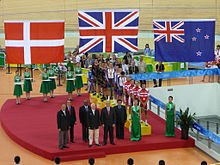
source
Denmark flag on the left-hand side, Union Jack of the United Kingdom and the Flag of New Zealand, flagged by a group of cycling events in the 2008 Summer Olympics.
After the competition in each division of the Olympic Games, a prize distribution ceremony was organized with all the winners. First, second and third placeholders were honored in this ceremony. Medal is awarded to the winner of the country's highest medal, as its representative. One of the members of the IOC handed the medals to the winners. At this time, three winners of the country's national flag were hoisted and national anthems of the first place holder were played. Generally the citizens of the host country work as volunteers in this event.
Sports
Olympic sports in 35 sports, 30 branches and about 400 sections are combined. Namely, wrestling is a summer Olympic sport, with two branches: Greco-Roman and Freestyle. In addition, on the basis of weight, 14 men and 4 women's departments are also present. At present, at the 26th Summer Olympics and at the Winter Olympics, 15 competitions are held in the Summer Olympics. In each of the summer Olympic Games, swimming, swimming, and gymnastics have been in regular competition. On the other hand, since the Winter Olympics began in 1924, cross-country skiing, figure skating, ice hockey, joint Nordic, ski jump, and fast skating sports are regular members of each of the events. Many of today's Olympic Games have been hosted at the Olympics as the first exhibition; For example, -Badminton, basketball, and volleyball
Every Olympic sport has an IOC recognized international controlling body. There are a total of 35 organizations representing the IOC. Among the recognized organizations, there are some sports organizations that play is not held at the Olympics. However, although these games are not recognized as the Olympic Games, the IOC Summit, after the success of any Olympic event, can be added to the next Olympics by amending the list of Olympic sports. The IOC summit is not just the introduction of new sports at the time of the Olympic Games; Any current sport is also dropped, and it is done on the basis of at least two-thirds of the total membership of the IOC. There are many IOC accredited sports like chess or surfing, which were not held anytime in the Olympics.
In October-November 2004, the IOC constituted an Olympic Programming Commission. The purpose of this commission was to review the current Olympic Games and the IOC unauthorized sports reviewing a specific methodology that would make it easier for everyone to schedule the program. The commission has fixed seven conditions on which to decide whether to be held at any sports event. These conditions are: - The cost of the sport's history and tradition, globalization, popularity, image, sports athlete, the development of the relevant international regulatory body and organizing the sport. Based on this assessment, five recognized sports (such as golf, karate, rugby union, roller sport and squash) were recommended for inclusion in the 2012 Summer Olympics. Following the review of these sports, the IOC Executive Council recommended a general meeting organized in Singapore in July 2005. Only two of the five games - Karate and Squash are selected for the final voting. But none of the required two-thirds of the votes did not get to the list of Olympic Games. In the next stage, IOC voted to include golf and rugby union competition in 2009 and 2016 in the 2020 Summer Olympics.
In the 114th IOC session held in 2002, it was decided to specify the size of the summer Olympics that - 10,500 athletes will participate in 301 departments of the maximum 28 sports. Three years later, the first important program change was achieved in the 117th IOC session. As a result, Baseball and Softball were dropped from the 2012 London Olympics. As there was no consensus about the replacement sport, at the 2012 Olympiad, there were 26 sports competitions. However, due to the entry of rugby and golf, the 28th of the maximum limit will be seen in 2016 and 2020 Olympics.
Professionalism and professionalism
The tradition of the values of British-based private schools in England strongly influenced Pierre the Kuberta. These private schools believed that sports is an integral part of education. This mentality can be said in a phrase, Latin: mens sana in corpore sano or, "healthy mind in healthy body". According to this ideology, he is a man who is skilled in all areas instead of a particular subject. Above was the idea of a tremendous integrity - where practice in any case was considered to be cheating. As a result, the person practicing professional mentality in any sport was considered to take advantage of unfair treatment from athletes of that sport.
Due to the elimination of professional athletes, the history of modern Olympics has dimmed in many debates. Olympic at the 1912 Summer Olympics at the Pentathlon and Deacathlon, Jim Thorp won the Olympic medal when it was known that he had played semi-professional baseball before the Olympics. IOC returned the medal in 1983, for the sake of humanity, after his death. Swiss and Austrian skiers dismissed the 1936 Winter Olympics, due to their trainers, in order to earn money or become professional, preventing them from participating in the Olympics.
At the end of the 20th century, with the change of socio-economic classification, the glorious image of the amateur sportsmen was gradually falling in tears. On the other hand, the "full-time amateur competition" received by government funding from the socialist countries of Eastern Europe helps in the decline of pure untimely attitudes due to the disadvantages of Western competitors in their own money. However, the IOC maintains traditional non-professional rules. Since the beginning of the 1970s, the rules of compulsory untouchability from the Olympic Charter began to relax. After the 1988 Summer Olympics, IOC, with the permission of the relevant international federation (IF), allows all professional athletes to participate in the Olympics. According to the 2012, no professional competes in boxing and wrestling only, though it is hereby defined in terms of the definition of unmarried, the rule of avoidance of money is restricted. Because some boxers and mallabis get financial prizes from their own National Olympic Committee.
Debate
Olympic elimination
Since the beginning of the Olympic Games in 1896, Australia, France, Great Britain and Switzerland have participated in every event. Other countries may not have participated in many events due to the absence of qualified sportspersons or for various political reasons. The Irish Olympic Council boycotted the 1936 Berlin Olympics. The reason was that the IOC asked them to join only the independent Irish state instead of the whole of Ireland's representation.
During the 1956 Summer Olympics, the Olympics are excluded for three different reasons: -
Due to the Soviet tyranny during the Hungarian Revolution, the Netherlands, Spain and Switzerland had boycotted the Olympic Games held in Melbourne. But the team sent to Stockholm for riding games.
Suez abandons Cambodia, Egypt, Iraq and Lebanon for crisis.
The Chinese people ("People's Republic of China") boycotted the Olympics protesting to take part in the Olympics as "Republican China" for Taiwan. Because the Republic of China refers to the previously united China. And the masses think that they are the genius of united China. China does not recognize the unique existence of Taiwan.
Most African states try to force the IOC to threaten boycott in the 1972 and 1976 Summer Olympics, so that ethnic dividing South Africa and Rhodesia are banned from the Olympics. New Zealand also became the target of accusations of these African states, when the New Rugby Union team of New Zealand went on tour to apartheid South Africa. Although IOC has banned South Africa and Rhodesia, Rugby has refused to ban New Zealand in this argument, not Olympic Games. As a result, the 1976 Montreal League boycotted the meeting with twenty African countries, Guyana and Iraq, although some athletes from these countries had participated in the Olympiad before the decision.
On the other hand, these two Olympians excluded Taiwan because the Republic of China (PRC) influenced the Montreal Organizing Committee and succeeded in imposing restrictions on the participation of Taiwan by the name of the Republic of China (ROC). Taiwan is said to be the prerequisite to participate in the Olympics, but they can use Republican flag and national anthem of China, but the Republican can not use the name China. Naturally, Taiwan denies that condition. Taiwan has not participated in the Olympics before 1984. Since 1984, Taiwan has been taking part in the Chinese Taipei and a special flag and new national anthem.
The 1980s and 1984 Olympics have resulted in the boycott of each other in the two countries in the cold war. The United States and more sixty-eight states excluded the 1980 Moscow Olympics in protest of the Soviet invasion of Afghanistan. As a result, only 81 states participated in the Olympics, which was the lowest participation since 1956 in the history of the Olympics. As a retribution, the Soviet Union and 15 other states, excluding the 1984 Los Angeles Olympics. As it is said, they are worried about the safety of the athletes of their own country. Soviet officials said in support of their boycott decision, "Extremist nationalist sentiment and anti-Soviet frenzy are being increasingly planned in the United States". Left-wing Eastern European countries participating in this boycott hosted an alternative multi-sports competition called Druzhba-84 or Friendship Games in July-August. In this event, 50 countries participate and 48 world records are created.
For the history of China's human rights violations in 2008, and for the time being, there was a public opinion about the Beijing Olympics and the elimination of Chinese goods as well as Chinese products for Tibetan unrest. But no state has boycotted support. On the other hand, in Georgia in 2008, Russia participated in the 2008 war of South Otisia, calling for the 2014 winter boycott of the Olympics. Because it was going to be held in Sochi, Russia. At the end, there was no boycott, Georgia itself participated in the Olympics.
politics
Since the beginning of the Olympic Games, the political ideology of different countries has been used as a medium of propaganda. When the Olympic Games were held in Germany in 1936, when the Nazis were strong enough to establish Aryan nationalism, the National Socialist Party was proclaimed as a liberal party. At the same time, German athletes showed a great sporting ability, which supported their claim of Aryan superiority. Although Germany won the largest number of gold medals, the achievement of the likes of African-American Americans such as Jesse Owens, or African-Jewish Ebolias, as well as the Hungarian Jews, gave the strongest assertion that Aryan superiority. The Soviet Union never joined the Olympics before the 1952 Helsinki Olympics. Instead of joining the International Games, the Soviets themselves organized a sporting event called Spartakyads. In the midst of the war between 1920 and 1930, the Communist and socialist organizations of different countries tried to promote the Olympics instead of the "bourgeois" Olympics. From the 1956 Summer Olympics, the Soviet Union was able to present itself as a great nation in the sport; And with the international reputation gained with it the full benefits. Many athletes also use the Olympic as a platform for their own political statements.
At the 1968 Summer Olympics in Mexico City, two US runners, Tommy Smith and John Carlos, who performed the first and third respectively in the 200 meters, took the Black Power Salute (or Greeting the Black Power) on the Bijoy stage. On the same stage, Peter Norman, second runner-up Australia, supports the human rights-related Olympic project symbol. In response, IOC President Avery Brundas ordered the US Olympic Committee (USOC), either to send those two athletes back to the country or to return the entire American racers to the country. America sent those two contestants back home. In the same Olympics, winning the joint gold medal in Czechoslovakia's gymnast, Kislavská, Bimet silver and the floor, the debate started with the use of the Olympics as a stage for the Soviet invasion of its own country. During the Soviet national anthem on the stage of the victory, Kaslovskaya turned his face towards the right of the Soviet flag with a head to protest. After returning to the country, Kislavskaya was not only done in one way; By participating in all his competition and banning travel, the Soviet government
In recent times, the Iranian government has been trying every effort so that their athletes do not compete with any Israeli athlete. At the 2004 Summer Olympics, an Iranian Judocha, Arash Mirizamy, did not fight with an Israeli opponent in a match. Although it was officially said that he could not qualify for more weight; After returning home, the Iranian government gave him $ 125,000, which was given to all the gold medal winners. Officially released from the charges of denial of intentional participation; However, this award is a cause for doubt in many.
Use of Efficient Drugs
In the early twentieth century, many athletes began to use skillful medicine. In 1904, athletic winner Athletes Thomas Hicks used sterchnic drugs provided by his instructor. In 1960, a Danish cyclist couple named Enmark Jenson died from a bike after being admitted to the games after taking drugs. It is found in autopsy that he died of side effects of amphitamin. This was the first incident of death in the Olympic Games due to the use of a strong drug. In the mid sixties, the Olympic federation took the lead on the use of skilled drug use; As a result, in 1967, the Olympic Council began to ban the use of drugs through the law.
Swedish Pentathlit Hans-Gunnar Liljanwal is the first sportsman to lose his bronze medal who could not qualify for the 1968 Summer Olympics. The most publicized drug scandal after this was Ben Johnston's case. He lost the 100 m race gold medal for using the Stanozolal drug in the 1988 Summer Olympics. The medal was given to Karl Lewis, who was seconded to the second time, who was once again used in the use of prohibited drugs before the start of the Olympics. To prevent the use of drugs in the Olympics, the World Anti-Drug Agencies (WADA) was formed in 1999, by the end of the nineties. As a result, in the summer of 2000 and the 2002 Winter Olympics, the number of untested athletes in the drug test increased at an alarming rate. Especially a large part of weight lifting and cross-country skiing athletes were caught for drug use. As a result of increasing awareness, only one competitor was caught in the medal trials during the 2006 Winter Olympics. The rules of the IOC-fixed drug test are considered as standards throughout the world; And other sports organizations try to follow it. During the Beijing Olympic Games, 3667 participants collect urine and blood samples and drug tests are under the supervision of the World Anti-Drug Agency. Prior to the start of the Olympics, many national Olympic Committee members have not been admitted to the Olympics because many of their own countries are not approved for the drug test, only three competitors are found in the drug test during the Olympics. After this success, more than 6000 drug-resistant drug examinations were conducted in London, including Olympics and Paralympics. In the previous Olympics exam, 107 participants were captured and expelled. During the Olympics, eight participants were caught and suspended. Among them, Shot Patter Nadia Ostapchuk, whose gold medal was taken away.
Terrorism and violence
Due to World War II, it was not possible to host three Olympic Games, these are 1916, 1940 and 1944. In 1916, the Olympic Games were canceled due to the Second World War in World War I, 1940 and 1944. Russia and Georgia fought on the day of the inauguration of the Beijing Summer Olympics in 2008, but the Olympic festival continued. It should be noted that at the opening ceremony, Russian Prime Minister Vladimir Putin, US President George Bush were present and discussed this situation in the midday meal, chaired by Chinese Premier Hu Jintao.
In the summer of 1972, at the Summer Olympics held in Munich, they were directly terrorized. A Palestinian militant outfit named Black September kidnaps 11 Israeli athletes. This brutal event in history is known as the Munich massacre. The militants killed two athletes immediately after their kidnapping, and after the failure of the prisoners to escape, they killed the remaining nine. A German police officer, including five militants, was also killed in that incident.
In the last two Olympics held in the United States, terrorist activities are seen. A bomb exploded near the Centennial Olympic Park during the 1968 Summer Olympics in Atlanta. Two people were killed and 111 wounded. Eric Rudolph, a local terrorist who is currently serving life imprisonment, was responsible for the incident. On the other hand, the 2002 Summer Olympics in Utrecht Salt Lake City began just five months after the tragic accident in the Twin Towers on 9/11. As a result, the security measures were very tight and unprecedented.
The practice of colonial politics
The Olympic Games have been criticized many times for the practice or promotion of colonial politics. The charge of the complaint is directly heading towards the International Olympic Committee or the organizers or its sponsors. According to critics, for the sake of colonial interests, for the Olympic Games, the disproportionate use of transmitting, removing, transforming the products, and disrespectful of ancient symbols and cultures of the landowners of the respective countries. They have been pushed towards further poverty by theft and forced possession of indigenous people's property. The most disgusting trend is seen in 1904 St. Louis, 1976 Montreal, Calgary in 1988 and the 2010 Vancouver Olympics.
Champion and other medalists
The first, second and third place holders of medals are given in each competition in the Olympiad or group. Until 1912, the champion was awarded the Narrate Gold Medal, silver was made of Gillette and now Gold Medal Silver Medal. However, every gold standard must have at least six grams of pure gold. Second and third placeholders were awarded silver and bronze medals respectively. There is no third place criterion in a single-run competition (e.g., boxing); Rather, both semifinals were awarded bronze medals. Only the first two were given a medal at the first Olympics of 1896 - the first ranked officer received the silver and the second ranked lady got bronze. Today's three medal styles begin with the 1904 Summer Olympics. Since the year 1948, the certificate for fourth, sixth and sixth placeholders was started, this certificate was officially called the Victory Certificate (or, Victory Diploma English: victory diploma); These certificates are also given to the seventh and eighth place holders of 1984 Olympics. In the 2004 Athens Olympics, the first three were given the olive leaf cloth with the medal. IOC does not keep any statistics regarding the medal, but various national Olympic Committee and the media keep these statistics and through this it judges success.
States
States at the Summer Olympics
As of 2012 London Olympics, all of the current 204 NOCs have participated at least once in the Olympics. On the other hand, Australia, France, United Kingdom, Greece, and Switzerland [B] have participated in each of the 27 Summer Olympics held so far.
States at the Winter Olympics
Main article: List of participating nations at the Winter Olympic Games
So far, 119 NOCs (110 of the 204 and 9 NOCs) have participated in at least one of the events in the Winter Olympics. Of these, twelve countries (respectively, Austria, Canada, Finland, France, UK, Hungary, Italy, Norway, Poland, Sweden, Switzerland, and the United States) participated in the two-day Winter Olympics held yet. Apart from the presence of Czechoslovakia and Slovakia since today's Czechoslovakia, they also participated in all the Winter Olympics.
Organizing country and city elections
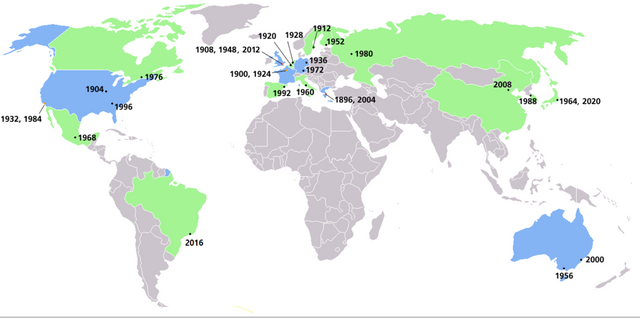
source
Map of the hosts of the summer Olympics The countries that once played the role of organizer are green, and those who have organized more than one summer Olympics have been identified by the blue color.
Seven-eight years before the Olympic Games event, the organizational city selection was performed. This procedure is usually completed in two steps. This whole process ends within two years. Interested cities first send proposals to the National Olympic Committee of their country. If multiple cities send a proposal to their national Olympic Committee at the same time, the committee will present a city's proposal to the International Olympic Committee through an internal election. Because of the IOC rules, a national Olympic Committee can offer a city name. After the expiry of the deadline for the proposal stage (proposal stage) in the first phase, a questionnaire has to be filled with potential host cities that are important for hosting the Olympics. Through this question paper, the applicants have to reassure the Olympic Committee that they will comply with all the rules of the Olympic Charter. Then, in the next step, the International Olympic Committee prepares applicants to list the applicants on the basis of qualifications, infrastructure, economic capability, political and geographical environment. The second stage (candidate stage) starts.
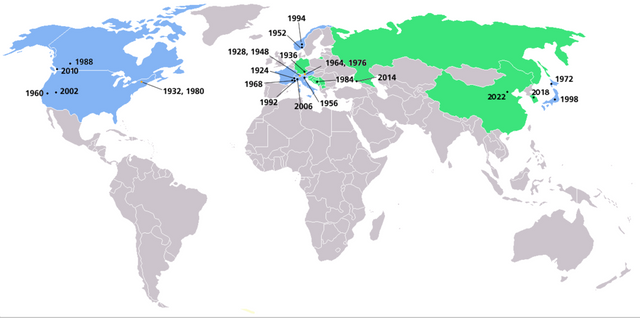
source
Map of the hosts of the Winter Olympics. The countries that once played the role of organizers are green, and those who have organized several winter Olympics have been marked by blue color.
After the selection of the candidate city, the documents related to further details of what they will do to organize the Olympic Games are to be deposited in the IOC. The IOC evaluation examines the documents in every city of the parliament. Even all the candidates went to the parliament in the city and talked to the local authorities, examining possible competition places and submitted the report a month before the IOC's final decision. The organizer has to pledge to bear all costs for the organizer of the Olympic Games. [165] After the completion of the Assessment Parliament, the general session of the IOC is sitting in a city that does not run to discuss the Olympic Games. The list of candidate cities is given to all the members there first. Then the final election is done by members vote. After the election, the organizing city and national Olympic Committee of the country jointly signed the agreement with the IOC City. According to this agreement, the city and country were officially recognized by the Olympic Organizer. [165]
In 2016 Olympics, the Olympics will be held in 44 cities in 23 countries. But outside of Europe and North America, the Olympics were organized just 8 times. From the 1988 Seoul Olympics, the Olympics are held in Asia and Oceania four times from today. However, there is no such precedence in the previous 92 years of Olympic history. The 2016 Rio Olympics will be the first Olympics in South America. Meanwhile, the Olympics have not been held in Africa yet.
The United States has organized the most, eight times (four-time summer and four-winter winter) Olympics. The UK capital London is holding the Olympic Games for the most three Olympic Summer Olympics. Germany, Australia, France and Greece have also hosted the Olympics two times. On the other hand, the cities that hold the Olympics twice are Los Angeles, Paris and Athens. Together with the 2020 Summer Olympics, Japan's Tokyo City will also have the honor of organizing the Olympics twice.
France is standing next to the United States after three years of organizing the Winter Olympics. Besides, Switzerland, Austria, Norway, Japan, Canada and Italy have hosted the Olympics twice. Organizers are organized twice in the city by Lake Placid, Innsbruck and St. Moritz .
